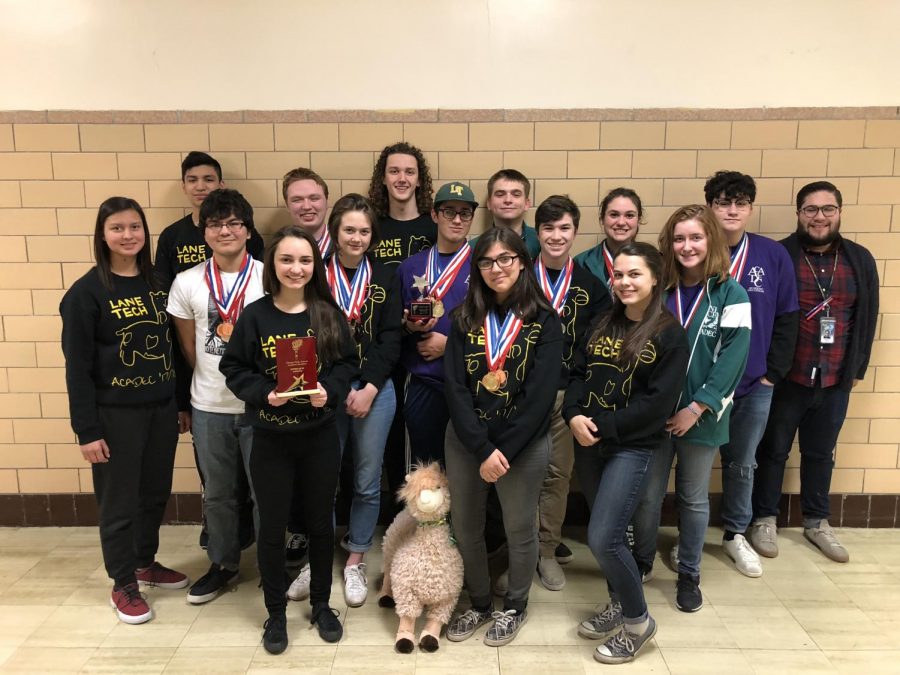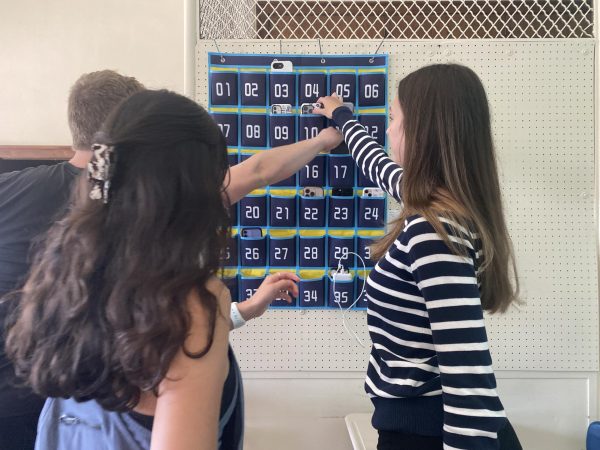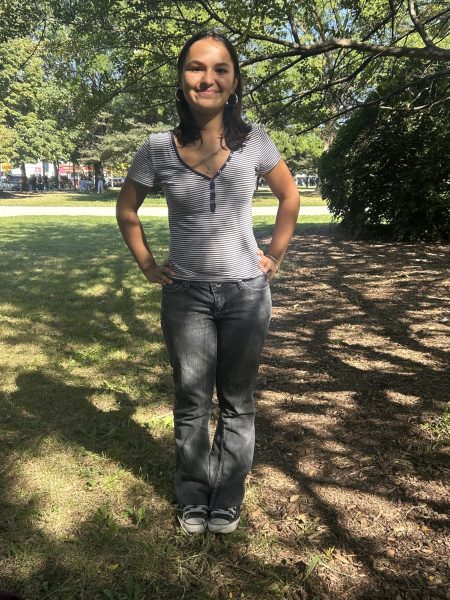Sports for the Brain: Academic Decathlon
The Academic Decathlon team poses with their medals and mascot, Al the Alpaca. (Photo courtesy of Mr. Campos)
After tedious preparation and nail biting questions, the Lane Academic Decathlon Team prepared to take on competitive schools during First Round Regionals Competition held at Chicago Vocational High School on Jan. 27.
With a determined mentality, Coach Campos led his team to victory.
At the Regionals Competition, students competed in seven subjects including the Biology of Infectious Disease, African Social Sciences and African Literature. The team competed in the Northwest division against Schurz, Amundsen, Northside, Steinmetz, Von Steuben, Mather, Prosser and Roosevelt. Lane won first place by a margin of over 10,000 points, or about 500 test questions.
Academic Decathlon is a class offered at Lane as well as an extracurricular activity.
“Students compete using the information that they have and their knowledge against other schools, and they win all kinds of medals and there is scholarship money available,” Campos said.
Students usually enroll in the Academic Decathlon class during their junior and senior years, according to Campos. It is usually a two year commitment.
Current decathlete Grace Aldrin, Div. 960, describes Academic Decathlon as challenging and competitive.
“We are given a very difficult task, and I think that it would be impossible for us to get to this point without supporting one another,” Adrin said. “Every day when I enter the classroom, I feel completely comfortable being myself — the Academic Decathlon team is so accepting of everyone involved. I really look forward to coming to class every day and absorbing new information, but it’s the group that really makes it for me.”
Aldrin believes that most challenging is balancing school work and Academic Decathlon.
“At times it can be difficult because we have to attend to our regular classes while learning seven new subjects,” Aldrin said. “I have found that scheduling my studies in advance has helped to set a limit on how much I am working each night, so that I don’t neglect my other classes. Being a part of the team has greatly improved my time management skills.”
Aldrin also mentioned that the team credits Campos for mentoring the decathletes in a way that made it easier to absorb so much information.
“Campos has done a great job of breaking down the work and giving presentations on difficult material,” said Aldrin.
Commitment to the class and club is often the biggest obstacle a student may face during the season.
“Academic Decathlon is a huge commitment, and while it was worth it, I had to make some changes in order to succeed in the class,” Aldrin said. “I think that coming into the group and seeing all of the material we’d be covering freaked me out a bit, but we took it in pieces and I had it down much faster than I thought I would.”
The club is student-run, meaning a select number of students are chosen within themselves to decide the pacing of how they want to learn, and what they are going to learn.
“Sometimes it’s like they handle all the scheduling, they handle all of the pacing, and decide what the assignments are and decide what goes in the gradebook,” Campos said. “But it breeds so much responsibility — and autonomy — that at this point in the year it’s really cool to watch happen.”
Lane is anticipating taking on its main rival, Whitney Young.
“We very handily take care of every other school, but we do not face them until the second round, so it is always interesting to see where we will come up,” Campos said.
The Academic Decathlon Team is preparing for the City Championship, where they face Whitney on Feb. 17.
Your donations directly fund the Lane Tech student journalism program—covering essential costs like website hosting and technology not supported by our school or district. Your generosity empowers our student reporters to investigate, write, and publish impactful stories that matter to our school community.
This website is more than a publishing platform—it's an archive, a research tool, and a source of truth. Every dollar helps us preserve and grow this resource so future students can learn from and build on the work being done today.
Thank you for supporting the next generation of journalists at Lane Tech College Prep!

Angelika Mazurek is a senior at Lane Tech. She was born in Poland and moved to America when she was six years old. Hanging out with her friends is one...




